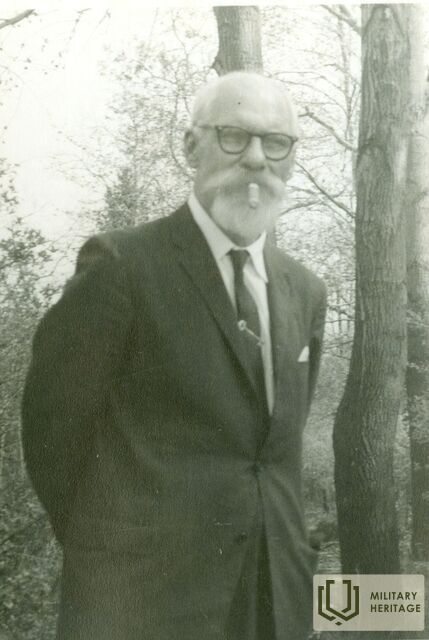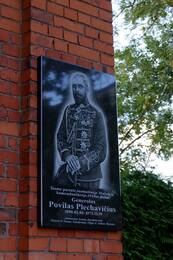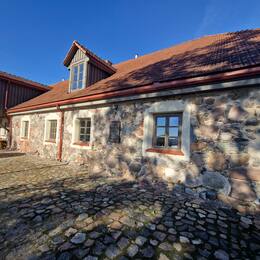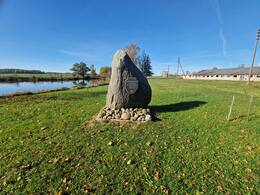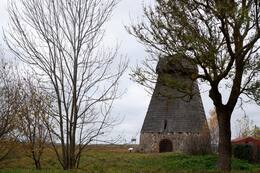General Povilas Plechavičius
I Wars of Independence, I WW1, Independence of the Baltic States, II WW2
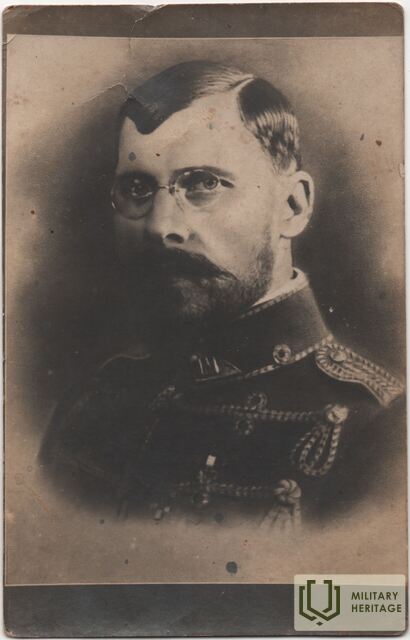
Povilas Plechavičius was born on February 1, 1890, in the Bukončiai farmstead (now Bukančiai), Židikų rural municipality. He was the second child in a large family – he had five brothers and six sisters. His mother, Konstancija Bukontaitė, came from an old Samogitian noble family, and his father, Ignas Plechavičius, was a simple peasant. Although the children were raised in a peasant and pragmatic manner, all of them were given an education.
Having started his education in Lithuania, in 1908 he graduated from the gymnasium in Moscow, in 1911 from the commercial institute, and in 1914 from the Orenburg cavalry military school. Together with his brother Alexander, he voluntarily chose to serve in the cavalry unit of the Russian army. During the First World War, he fought on the Austro-Hungarian front, participated in battles with the German, Austro-Hungarian and Turkish armies, and was wounded three times.
In 1918, having returned to Lithuania with his brother Aleksandrs, he became involved in the struggle for independence. At that time, Lithuania was in turmoil – the country was being plundered by soldiers returning from the fronts, Bermontists, Bolsheviks and local criminals. P. Plechavičius formed partisan units in the Seda, Mažeikiai and Telšiai areas. In 1919, he received the authorization of the Minister of Internal Affairs and was appointed commandant of Seda, and later of Mažeikiai city and county.
After the independence struggle, P. Plechavičius was tried for alleged cruel treatment of enemies. In court, he uttered a historic phrase: "Your Honor, if it had not been for me or another person like me, you would not be sitting here today." He was acquitted.
In interwar Lithuania, P. Plechavičius continued his military career: in 1924 he graduated from the Higher Officer Courses in Kaunas, in 1926 – from the Academy of the General Staff of Czechoslovakia. In 1926 he became one of the commanders of the December 17th Coup. After the coup, he held high positions: he was appointed Chief of the General Staff of the Army, Chief of the Cavalry. In 1929 he was awarded the rank of Lieutenant General, but in the same year he was released into the reserve.
During World War II, P. Plechavičius again became a significant figure. In 1944, he founded the Local Squad, which was to defend the territory of Lithuania from Soviet partisans. His call received a huge response - about 20 thousand young men registered. When the Germans tried to transform the squad into SS units, P. Plechavičius resisted and was arrested and sent to the Salaspils concentration camp.
After the war, P. Plechavičius fled to Germany, and in 1949 emigrated to the USA. In Chicago, he actively participated in the activities of the Lithuanian community, and in 1950-1959 he headed the Lithuanian Veterans' Union "Ramovė". He died on December 19, 1973 in Chicago, and was buried in St. Casimir's Cemetery.
For his services to Lithuania, P. Plechavičius was awarded the Orders of the Cross of Vytis, 5th degree (1923) and the Order of Gediminas, 2nd degree (1928), and in 2004 he was posthumously awarded the Grand Cross of the Order of the Cross of Vytis.






More information sources
Related timeline
Related objects
Former military commandant's office, memorial plaque of General P. Plechavičius
Near the Mažeikiai railway station stands the building of the former Mažeikiai military commandant's office.
The ceramic brick, historicist style building is associated with the establishment of the independent state of Lithuania in 1919. This building housed the military commandant's office, where Lieutenant General Povilas Plechavičius (1890-1973) worked. In 1919, he was the commandant of the Seda-Mažeikiai war, and from 1921, he was a regiment commander, and in 1927-1929, he...
Seda Water Mill
In the town of Seda, on the wall of a mill near the Varduva River, you can see a plaque telling about the Seda Commandant's Office.
The Seda Commandant's Office was established on 10 December 1918 by Povilas Plechavičius, a Lithuanian army general known for his battles against the Bolsheviks and Bermontites. Shortly before, on 25 July 1918, having returned to Lithuania from Russia, P. Plechavičius settled in Samogitia and organised volunteer partisan units to fight against the Bolshevik and Bermontite...
Birthplace of Gen. P. Plechavičius
In the village of Bukančiai, Mažeikiai district, there is a memorial stone on a lawn near a small pond. This stone marks the birthplace of Lithuanian Army General Povilas Plechavičius.
Povilas Plechavičius was a Lithuanian army general, famous for his battles against the Bolsheviks and Bermontists. P. Plechavičius organized volunteer partisan units in Samogitia to fight against the Bolshevik and Bermontist forces, with whom he fought in the Seda, Mažeikiai, Kretinga and Telšiai areas. He led the coup d'état in Lithuania on 17 December 1926, during which...
Radviliškis windmill
The octagonal 4-story wooden mill stands near the outskirts of Radviliškis, in the village of Vaidulių.
The Radviliškis windmill was built in the 19th century. at the end of 1984-1985 - restored. It is said that in 1919 November 22 near the mill, the famous battle of the Lithuanian volunteer army took place with the Bermontinkai, a Russian military unit with a provocative orientation. After the Bermontians captured Radviliškis, an important railway junction, Lithuania's independence...
Related stories
Memories of the Struggles for Lithuanian Freedom
Povilas Plechavičius – Lithuanian army general, famous for his battles against the Bolsheviks and Bermontites. After returning to Lithuania from Russia on 25 July 1918, P. Plechavičius settled in Samogitia and organized volunteer partisan units to fight against the Bolshevik and Bermontite forces, with whom he fought in the areas of Seda, Mažeikiai, Kretinga and Telšiai.




